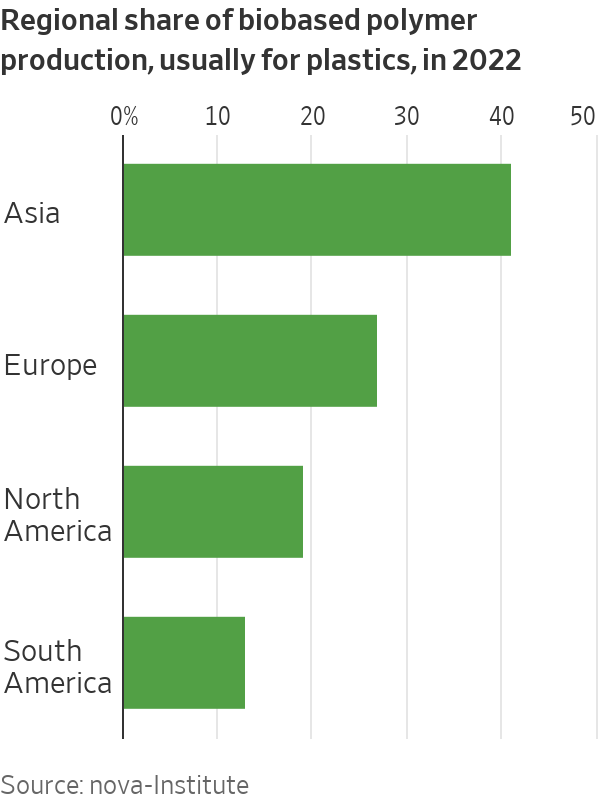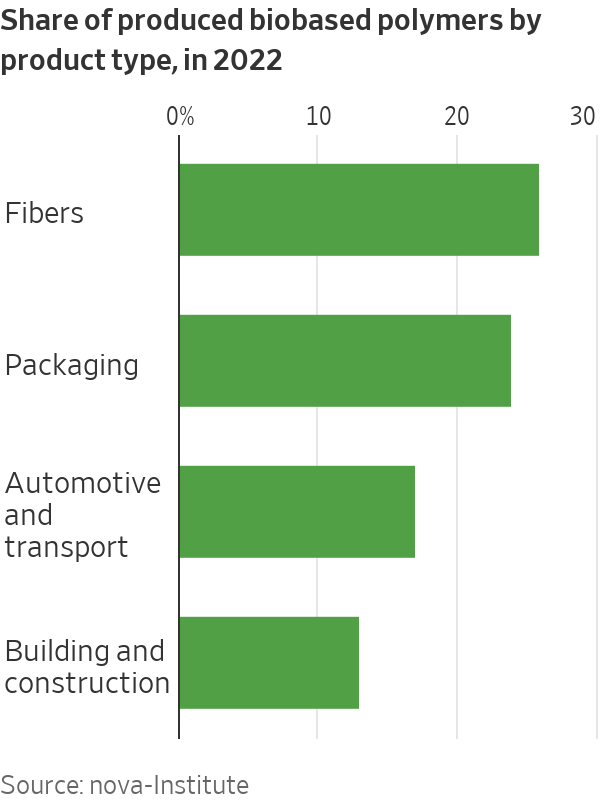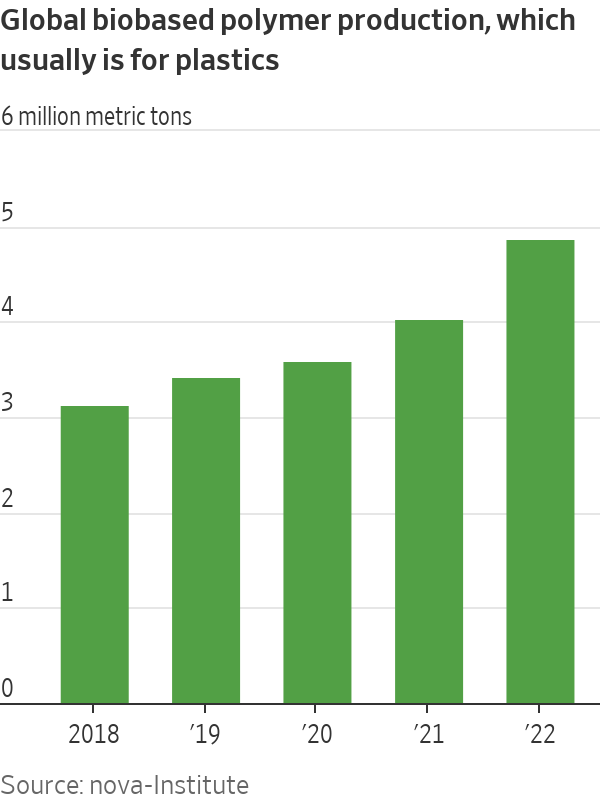Plant-Based Plastics Gain Favour as Companies Pursue Sustainability Goals
Bioplastic production is growing at a record clip amid strong demand from fashion and food-packaging companies, in particular
The future is more plastic. Plant-based plastic, that is.
Plant-based plastics, or bioplastics, have accounted for just 1% of the world’s plastic production for well over a decade, according to a review of more than 100 companies by research organisation nova-Institute. Bioplastics haven’t taken off largely because they are typically 50% to 80% more expensive than traditional fossil-fuel-based plastics, but their production is now growing 14% a year, putting them on track to reach up to 3% of the plastics market in the next five years.
Bioplastics are expanding faster than recycled plastic in some cases, such as in Asian countries like China and Japan that are mandating more ecologically friendly materials, nova-Institute founder Michael Carus said. Even if global plastic recycling rates someday reach 70% compared with around 9% today, bioplastics alongside materials made from captured carbon dioxide will have a big role to play asthe world transitions away from fossil-fuel-based materials, he said.
“Not one of them can do it alone,” Carus said, referring to the sustainable materials that will drive the green transition.

Bioplastics’ benefits
Bioplastics are usually derived from plants rich in starch, sugar or pulp, such as corn, wheat, sugar cane, wood and cotton, which makes them costlier than plastics made from fossil fuels because crops need fertiliser and other resources such as water. However, the environmental benefits of plant-based plastics are increasingly appealing to companies promising to use more sustainable materials by the end of the decade.
Plants absorb the atmosphere’s carbon dioxide, which cuts the greenhouse-gas emissions from making bioplastics to at least half that of fossil-fuel-based plastics. Bioplastics can also sometimes cause less pollution when they degrade in the environment.
Broadly, there are two types of bioplastics: Materials that have similar performance to plastic, such as pulp-derived cellulose acetate found in eyeglasses and textiles, and bioplastics that are chemically identical to conventional plastics, such as a polyethylene, polyester and nylon. Around half of today’s bioplastics are biodegradable, according to nova-Institute, meaning they break down more naturally and are less harmful to habitats. Still, many of these bioplastics require industrial composting facilities to degrade and aren’t designed to be thrown away in a home garden.
Some of the earliest adopters of bioplastics are fashion companies, including Lululemon, which has a goal to replace the majority of oil-based nylon with plant-based nylon by 2030. A big selling point for the sportswear company is using plants to make chemically identical nylon that can be easily switched in, but still cuts emissions by nearly half.
The strongest demand for bioplastics is currently from fashion and food-packaging companies, but interest is also rising from companies in cosmetics, electronics and more durable goods such as tools, Eastman Chemical’s Chief Technology Officer Chris Killian said.
Eastman, formerly a division of Kodak, earns more than $1 billion of its $10 billion or so in yearly sales from bioplastics made from cellulose acetate, a material it has produced for more than 70 years. Cellulose acetate, which Eastman makes from cotton linters and wood pulp, was first used in Kodak film in the company’s early days, but it is now expanding into packaging, textiles and other applications. In 2022, Eastman signed an agreement with Warby Parker for the material to be used in eyewear.

“It has a great deal of legs,” he said of the cellulose acetate-derived plastics.
Challenges ahead
Plant-based plastics remain a tough sell because fossil-fuel-based plastics are much cheaper, but prices could fall if companies continue to buy more bioplastics and governments encourage their use. This year, the Biden administration called on the federal government to assess the potential for biomaterials, including for plastics, fuels and medicines. And last year, the U.S. Defense Department said it would invest $1.2 billion in bio manufacturing. The European Union is also considering mandating bioplastics under packaging rules that are being discussed.
In the U.S., there is government support at the state and federal level to convert biological raw materials into fuels such as ethanol, but that level of support doesn’t yet exist for plant-based plastics, said Manav Lahoti, chemical giant Dow’s global sustainability director, olefins, aromatics and alternatives.
“The market is ready to take off on the demand side,” he said. “But to make the economics work, there is some regulatory support that is required.”

Another hurdle to scaling up bioplastics is what happens at their end of life. Only plant-based plastics that are chemically identical to fossil-fuel–based versions can enter the existing and growing recycling infrastructure. The world’s limited amount of feedstock, which often goes to feeding cattle and other livestock, also presents challenges to using more bioplastics.
One answer: turning agricultural waste into recyclable plastics.
This year, Dow struck an agreement with biomass refinery startup New Energy Blue to buy bioethylene made from the stalks and leaves of corn grown in Iowa. Dow will then make conventional and recyclable plastics from the material and sell to companies in transportation, footwear, and packaging.
Dow is already providing bioplastics for Crocs shoes and LVMH Moët Hennessy Louis Vuitton’s perfume packaging, and sees demand outstripping supply, said Haley Lowry, Dow’s global sustainability director for packaging and specialty plastics.
“We are trying to find more sources,” she said. “The demand from our customers is there; it’s really finding the sources of biofeed that makes sense.”
 Copyright 2020, Dow Jones & Company, Inc. All Rights Reserved Worldwide. LEARN MORE
Copyright 2020, Dow Jones & Company, Inc. All Rights Reserved Worldwide. LEARN MORE
Chris Dixon, a partner who led the charge, says he has a ‘very long-term horizon’
Americans now think they need at least $1.25 million for retirement, a 20% increase from a year ago, according to a survey by Northwestern Mutual
The G80 Sport makes its entrance, displaying dynamic design details and elevated automative capabilities.
Juma Al Majid LLC, the exclusive dealer for Genesis in the UAE, has launched the G80 – a cutting-edge luxury sedan. Merging tradition with innovation, this model embodies Genesis‘ relentless pursuit of superior design, state-of-the-art technology, and unmatched luxury.
The new G80 marks a significant milestone in introducing Korean automotive excellence to the UAE, highlighting the brand’s commitment to providing exceptional experiences.
Meticulously crafted, the redesigned G80 adheres to the ‘Athletic Elegance’ design philosophy synonymous with Genesis. This luxury vehicle features refined details and cutting-edge specifications, combining comfort and style to elevate every driving experience to new heights.
“The debut of the all-new G80 in the UAE market propels our vision to converge advanced technology and refined elegance”, stated Suliman Al Zaben, Director of Genesis, UAE. “This launch is a step forward for Genesis in the UAE market and strengthens our efforts to offer ultimate luxury, innovation, and unique design to our incisive customer base.”
With a new dual-mesh design, the G80’s exterior enhances the sophisticated appearance of the Two-Line Crest Grille, paired with iconic Two-Line headlamps featuring Micro Lens Array (MLA) technology. This highlights Genesis’ commitment to harmonizing advanced technology with elegant design. The five 20-inch double-spoke wheels exude a dynamic aesthetic, resembling sleek aircraft lines, complementing the car’s parabolic side profile. Rear diffusers conceal mufflers adorned with distinctive V-shaped chrome trim inspired by the Crest Grille, embodying an eco-conscious ethos in today’s technology-driven era.

The G80 reinforces Genesis’ design philosophy in its interiors, inspired by the uniquely Korean concept of the Beauty of White Space, integrated with state-of-the-art technology to create cosmetic brilliance for users. The 27-inch-wide OLED display seamlessly combines the cluster and AVN (Audio, Video, Navigation) screen in a horizontal layout, extending to the center fascia, showcasing its flair for innovative technology. The touch-based HVAC (Heating, Ventilation, and Air Conditioning) system offers ease of control, while the redesigned crystal-like Shift By Wire (SBW) ensures a comfortable grip, infusing a sense of luxurious convenience.
With its dual-layered Crest Grille and expanded air intakes, the G80 Sport package delivers a dynamic and sporty spirit. Exclusive interior options, such as a D-cut steering wheel and carbon accents, enhance its sporty allure. Equipped with Rear Wheel Steering (RWS) and Electronic Limited Slip Differential (E-LSD), the G80 Sport 3.5 twin turbo model is built for stable control during high-speed maneuvers.
Fitted with advanced safety and convenience features, this luxury sedan includes Remote Smart Parking Assist 2, Lane Following Assist 2, and a Fingerprint Authentication System. The three-zone HVAC system provides customized climate control for all passengers. With two powertrain options – a 2.5 turbo engine delivering 300 horsepower and 43.0 kgf·m of torque, and a 3.5 twin turbo engine producing 375 horsepower and 54.0 kgf·m of torque – superior driving dynamics ensure a silent and luxurious driving experience.

Chris Dixon, a partner who led the charge, says he has a ‘very long-term horizon’
Americans now think they need at least $1.25 million for retirement, a 20% increase from a year ago, according to a survey by Northwestern Mutual





















